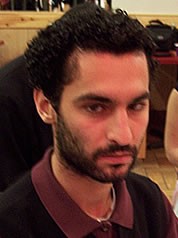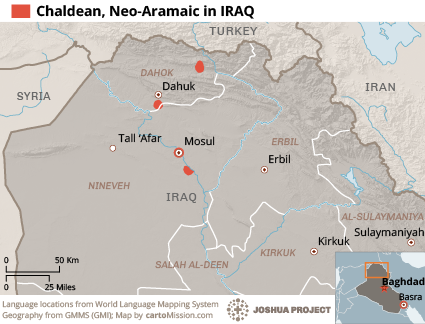Ethnically they are Assyrians. They are Catholic Assyrians, adherents of the Chaldean Catholic Church. According to the Catholic Encyclopedia strictly the name of Chaldeans is no longer correct, they have no historical relationship with the old Chaldeans tribes inhabited southern part of Assyrian empire as mentioned in Bible "Behold the land of the Chaldeans; this people was not, till the Assyrian founded it for them that dwell in the wilderness" Isaiah. 23:13 They are the former Assyrian Nestorians united with the Roman Church. In 1551, the Christian community in the province of Atour (Assyria) refused to accept the appointment of Shim'un VII Denka as Patriarch of the Church of the East, They sent a monk, Youhanna Sulaqa the abbot of Mar Hurmizd monastery to Rome. In early 1553 Pope Julius III proclaimed him Patriarch Simon VIII "of Nineveh in east Atour (Assyria)" and ordained him a bishop in St. Peter's Basilica on April 9, 1553 as Patriarch of Nineveh, known as the District of Atour (Assyria). The new Patriarch returned to his homeland in late 1553 and began to initiate a series of reforms. But opposition, led by the rival Assyrian Patriarch, was strong. Simon was soon captured by the pasha of Amadiya, tortured and executed in January 1555. Over the next three centuries, difficulties of communication gave rise to problems. The Sulaqa line (normally with the name Simeon) remained in communion with Rome until 1672, while members of the other line (with the name Elias) briefly entered communion with Rome on several occasions. In 1681 a new Uniat line of Patriarchs at Diyarbekr was inaugurated (with the name of Joseph) to last for well over a century. The first time a Patriarch was associated with the word Chaldean was Youhannan Hurmizd who was called by Pope Pius XIII in 1828 "Patriarch of Chaldean" over the "Chaldean Rite" in which the Church became definitely Papal in its obedience as one of the "Uniate Churches" of the East. And the first to be called the "Chaldean Patriarch" was Mar Nicolas Zaia in 1844. Later the word Babil was added in 1847 when Mar Yousif Odo was consecrated as "Patriarch of Babylon over the Chaldean." while as we mentioned that in 1553 Pope Julius III proclaimed him Patriarch Simon VIII, therefore the name Chaldean refers to the (Catholic) 'rites' of the Assyrian Nestorians those connected with the Catholic Church in Rome.
Geographically, the Catholic Chaldeans originate from central historical Assyria, the Nineveh plains, and Nineveh province nowadays where the ruins of the ancient Assyrian capitals of Nineveh and Nimrud are located. In addition to Iraq, migrant Chaldean communities are found in the United States, European Union countries, Turkey, Syria, Iran, and Lebanon.
Many of Chaldean are businessmen and technocrats, and a few have assumed high government positions.
As with the vast majority of Assyrian peoples, Chaldeans completely are completely Ch
The Assyrian people in Iraq are under persecution, experiencing killing, kidnapping and displacement.
Pray for the Holy Spirit to purify the Assyrian Church in Iraq.
Pray for hundreds of Assyrians to find their way to a vibrant and joyful relationship with Jesus.
Pray for the Lord to use Assyrians to plant gospel seeds among Iraq s Muslims.
Scripture Prayers for the Chaldean in Iraq.
| Profile Source: Joshua Project |











